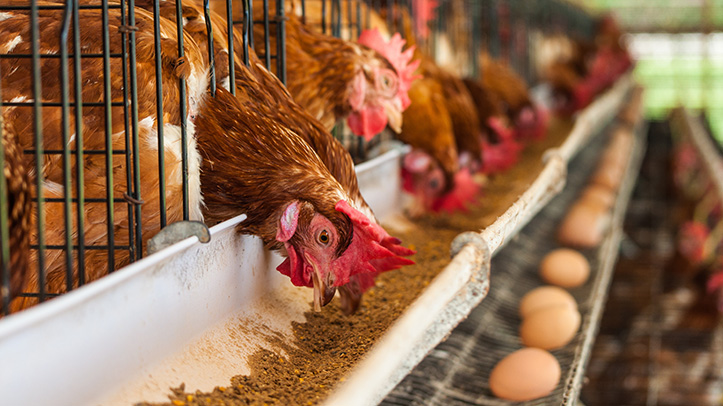A consultation on banning the use of cages to house laying hens for egg production has been launched in Scotland.
Views will be sought on phasing out the use of enriched cages, which offered more room to nest, roost, scratch and rest than the previously used battery cages that were banned in the UK in 2012.
Over 1.1 million hens were housed in cages in Scotland as of February 2024.
Agriculture Minister Jim Fairlie said: “As we committed to in our Programme for Governments, we want to improve the welfare of laying hens to ensure their confinement does not negatively impact their normal behaviours.
“Significant progress has already been made in recognising the importance of animal welfare – both in government policies and the demand from the public in the choice they make when shopping. If implemented, the ban would be another example of Scotland leading the way in improving the welfare of animals by being the first UK nation to ban the practice.
“We’ve seen the European Union put forward legislation to prohibit using cages for all farmed livestock, with Luxembourg and Austria already banning them and others phasing them out. In the coming weeks will also call for evidence on the use of cages in the gamebird and quail egg and meat sectors ahead of consulting on phasing out cages in those sectors in due course. I would encourage everyone with an interest in this issue to take part to help us shape how we protect the welfare of laying hens.”
The consultation will run for 12 weeks, until Tuesday 25 June 2024.
Gary Ford, British Egg Industry Council Chief Executive, said: “The BEIC has serious concerns about a proposed ban on colony cages in Scotland.
“The welfare of laying hens from all systems of production is of primary importance to the UK’s egg producers. In the UK, around a quarter of eggs consumed are laid by hens kept in enriched colony cage systems, meeting demand for affordable, nutritious, high-quality food, and providing a vital option for a large section of the population, particularly during the ongoing cost of living crisis.
“In addition to consumers, producers in Scotland who export to the rest of the UK will also be disadvantaged by the proposed changes.
“Unless Scotland is planning to close its borders it is likely that, in the event of a cage ban, retailers and foodservice operators will resort to importing caged eggs from outside of the UK, potentially with significantly lower welfare standards. There are also trade deals in place with countries that still use battery (‘barren’) cage systems, illegal in the UK since 2012. With a substantial proportion of the UK’s eggs produced in Scotland, a ban could lead to job losses and a direct impact on its economy, as well as reducing the number of eggs in the market putting additional pressure on free range supply.
“British egg producers are responsive to market needs and will produce what people want to buy. Currently, consumers are able to choose eggs from different production systems, which are all clearly labelled, and we strongly urge the Scottish government to continue to allow Scottish shoppers the choice to buy the eggs that most meet their requirements.”


